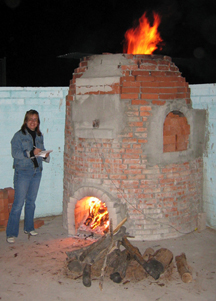Affiliation: University of Arizona

Eleni Hasaki is a Professor of Anthropology and Classics at the University of Arizona. She received her B.A. from the University of Athens, Greece and her Ph.D. from the University of Cincinnati. She is an active member of the AIA Tucson Society, where she serves in a variety of roles, and as president from 2012-2016. She has published on craft technologies, apprenticeship, the spatial organization of workshops, and social network analysis of communities of practice in the Classical world. She has excavated pottery workshops in Greece and directs the ethnoarchaeological study of relocating a potters’ quarter in Tunisia. Her experimental archaeology projects at the Laboratory for Traditional Technology have centered on the wheels and kilns of ancient Greek potters. She promotes Digital Humanities through the WebAtlas of Ceramic Kilns in Ancient Greece and the NEH-funded collaborative project SNAP: Social Networks of Athenian Potters. Hasaki recently coedited a volume on Reconstructing Scales of Production in the Ancient Greek world (Heidelberg 2020). Her 2021 monograph (Potters at Work in Ancient Corinth: Industry, Religion, and the Penteskouphia Pinakes; Hesperia Supplement 51) focuses on the largest group of scenes with potters at work from classical antiquity. Her research has been funded by major institutions, including Harvard’s Loeb Classical Library Foundation, Archaeological Institute of America, Kress Foundation, and American Philosophical Society. More recently, she was a Harvard Fellow at the Center for Hellenic Studies, and a Senior Fellow at the National Gallery of Art, Center for Advanced Study in the Visual Arts (CASVA).
February 23, 2024 @ 12:00 pm
Greek pots, with their delicate shapes, lively scenes and varied contexts of use and deposition have enjoyed great popularity with ancient and modern viewers alike. They have also been scrutinized as documentation of gender roles, extent of literacy, social and economic status, and as media for political propaganda. Scholars have recently widened their research scope to highlight the potters who produced these vessels… Inside their workshops, potters operated the wheel or the kiln not by using high-tech settings but by applying their skills fine-tuned over decades or even generations. Even when technical secrets were well-guarded in an environment of relentless competition, everyone knew and appreciated the long hours that a potter had to practice to achieve perfection. A potter’s apprenticeship at the wheel was so long and arduous that even Greek philosophers used it as the most effective metaphor for conveying the importance of mastering all topics in a slow and structured manner. A closer look at the spatial layout and technological equipment of their workshops and at the workforce relationships brings these establishments alive with masters, apprentices, middlemen, and purchasers, constantly negotiating their roles inside and outside the workshop. Beyond their advanced skill set, Greek potters often prayed to gods to secure successful firings and to protect their businesses from local and global competitors in ever-changing configurations of trade networks. Moreover, the potters also relied on their social networks of their industrial quarters, where they could maintain established traditions and promoted innovative techniques.
Short bibliography and/or website on lecture topic:
Pdfs available at https://arizona.academia.edu/EleniHasaki
Hasaki, E. 2020. The WebAtlas of Ceramic Kilns in Ancient Greece: A Research Gateway to the Study of Hellenistic Ceramic Workshops. In S. Drougou (ed.), Pottery Workshops, Craftsmen and Workshops, Athens, 280–312
Hasaki, E. and D. H. Cline. 2020. Social Network Analysis and Connoisseurship in the Study of Athenian Potters’ Communities. In E. Hasaki and M. Bentz (eds.), Reconstructing Scales of Production in the Ancient Greek World: Producers, Processes, Products, People, Heidelberg, 59–80
Hasaki, E. 2019. Potters and their Wheels in Ancient Greece: Skills and Secrets in Communities of Practice. In M. Denti and M. Villette (eds.), Archéologie des espaces artisanaux. Fouiller et comprendre les gestes des potiers, Rennes, 297–314
Hasaki, E. 2013. Craft Apprenticeship in Ancient Greece: Reaching beyond the Masters. In W. Wendrich (ed.), Archaeology and Apprenticeship: Acquiring Body Knowledge in the Ancient World, Tucson, 171–202